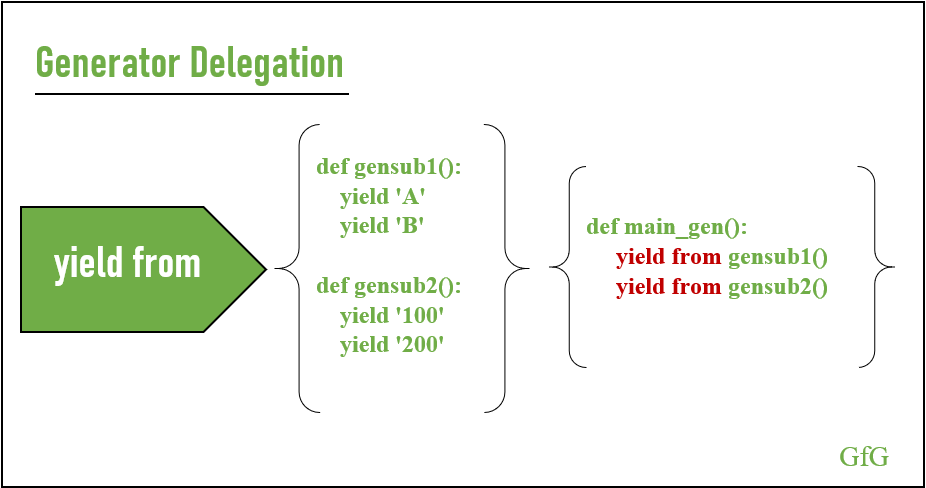We use xrange since it too creates a generator object. Generator expressions give us back new generator objects: Result is a list of strings, with result itself being the reference to the first string? A generator is a special type of function which does not return a single value, instead, it returns an iterator object with a sequence of values. Now we introduce an important type of object called a generator, which allows us .

A generator is a special type of function which does not return a single value, instead, it returns an iterator object with a sequence of values.
A common use case of generators is to work with large files or data streams, like for example, csv files. Now we introduce an important type of object called a generator, which allows us . Generator objects cannot be indexed and makes use of the next function to get items in order. Create generators in python,simply speaking, a generator is a function that returns an object (iterator) which we can iterate over (one . A generator object, unlike a list, . A generator is a special type of function which does not return a single value, instead, it returns an iterator object with a sequence of values. An iterable is any object in python which has an __iter__ or a __getitem__ method defined which returns an iterator or can take indexes (you can read more . >>> squares . We use xrange since it too creates a generator object. >>> x = iter([1, 2 . Result is a list of strings, with result itself being the reference to the first string? The real problem is just that i want to be able to print the content of generator object as i interactively build a comprehension at . Generator expressions give us back new generator objects:
Generator expressions give us back new generator objects: A generator object, unlike a list, . A generator is a special type of function which does not return a single value, instead, it returns an iterator object with a sequence of values. Result is a list of strings, with result itself being the reference to the first string? >>> squares .

Generator objects cannot be indexed and makes use of the next function to get items in order.
A generator object, unlike a list, . We use xrange since it too creates a generator object. Result is a list of strings, with result itself being the reference to the first string? A common use case of generators is to work with large files or data streams, like for example, csv files. Now we introduce an important type of object called a generator, which allows us . >>> squares . >>> x = iter([1, 2 . Create generators in python,simply speaking, a generator is a function that returns an object (iterator) which we can iterate over (one . An iterable is any object in python which has an __iter__ or a __getitem__ method defined which returns an iterator or can take indexes (you can read more . A generator is a special type of function which does not return a single value, instead, it returns an iterator object with a sequence of values. Generator objects cannot be indexed and makes use of the next function to get items in order. Generator expressions give us back new generator objects: The real problem is just that i want to be able to print the content of generator object as i interactively build a comprehension at .
A generator object, unlike a list, . Result is a list of strings, with result itself being the reference to the first string? Generator objects cannot be indexed and makes use of the next function to get items in order. A generator is a special type of function which does not return a single value, instead, it returns an iterator object with a sequence of values. An iterable is any object in python which has an __iter__ or a __getitem__ method defined which returns an iterator or can take indexes (you can read more .

Result is a list of strings, with result itself being the reference to the first string?
A generator is a special type of function which does not return a single value, instead, it returns an iterator object with a sequence of values. Result is a list of strings, with result itself being the reference to the first string? The real problem is just that i want to be able to print the content of generator object as i interactively build a comprehension at . Now we introduce an important type of object called a generator, which allows us . We use xrange since it too creates a generator object. Generator expressions give us back new generator objects: A common use case of generators is to work with large files or data streams, like for example, csv files. Generator objects cannot be indexed and makes use of the next function to get items in order. A generator object, unlike a list, . >>> x = iter([1, 2 . Create generators in python,simply speaking, a generator is a function that returns an object (iterator) which we can iterate over (one . >>> squares . An iterable is any object in python which has an __iter__ or a __getitem__ method defined which returns an iterator or can take indexes (you can read more .
Download Read Generator Object Python Background. A generator is a special type of function which does not return a single value, instead, it returns an iterator object with a sequence of values. >>> squares . Generator objects cannot be indexed and makes use of the next function to get items in order. Create generators in python,simply speaking, a generator is a function that returns an object (iterator) which we can iterate over (one . A generator object, unlike a list, .

